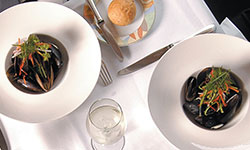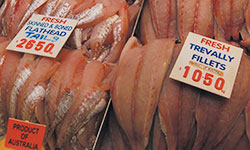Who can legally sell their catch
Only fishers who hold valid commercial fishing or aquaculture licences or permits can legally sell the fish and shellfish they catch or produce.
The VFA has produced a brochure to help explain the rules.
Who are recreational fishers?
Recreational fishers do not hold a commercial fishing licence or permit.
Recreational fishers catch fish for fun, sport and to feed themselves and their immediate family.
Why is buying fish and shellfish from a legitimate commercial seller so important?
Fish and shellfish bought from commercial fishers and producers are subject to strict food safety standards, required under the Food Standards Code and administered by Prime Safe.
PrimeSafe is the regulatory body responsible for seafood safety.
Recreationally caught fish are not subject to any of these food safety measures. Buyers of illegal recreationally caught fish and shellfish are risking their customers’ health and the reputation of their business.
PrimeSafe contact (03) 9685 7333 for further information or through their website.
What species are most commonly offered for illegal sale?

The fish and shellfish most commonly caught by recreational fishers and offered for sale include:
- marine fish such as bluefin tuna, snapper, whiting and flathead
- freshwater fish such as Murray cod and golden perch
- molluscs such as abalone, pipis and calamari (squid)
- Invertebrates such as rock lobster
What happens if your business is caught buying fish or shellfish from a recreational fisher?
The maximum penalties for businesses or people convicted of illegally receiving or selling recreationally caught fish and shellfish are:
- fines of>$30,000; and
- up to 12 months in prison

The maximum penalties for businesses or people convicted of illegally receiving or selling recreationally caught priority species - abalone, rock lobster, Murray cod and bluefin tuna are:
- fines of >$180,000; and
- up to 10 years in prison.
Recreational fishers found selling or trading their catch face the same fines.
Non compliance with the Food Standards Code can also result in:
- fines of up to $40,000 for the individual or $200,00 for a company;
- loss or suspension of their licence to operate a food business.
How can I protect my business and ensure the fish and shellfish I buy is safe to eat and legally caught?

If you are caught, the fisher and buyer could face significant fines and jail terms
If you intend to buy and sell fish (including shellfish) for human consumption you must:
- keep a record of the purchase transaction; and
- ensure that food you purchase is handled in accordance with the Food Standards Code to avoid contamination. To view the code search online ‘food standards code Australia’.
If in doubt when purchasing seafood, don't hesitate to ask where it was sourced.
Don't risk your customer's health or your business reputation when buying fish or shellfish
Always ask the seller for a receipt.
The legal requirement for receipts vary with fish and shellfish species.
Who do I contact if I suspect businesses or recreational fishers are illegally selling fish and shellfish?
If you:
- are approached by a recreational fisher trying to sell their catch; or
- suspect a seafood business is sourcing its seafood illegally
Report them to 13 FISH (13 3474)
This is the Victorian Fisheries Authority's 24 hour, 7 day a week reporting service.
